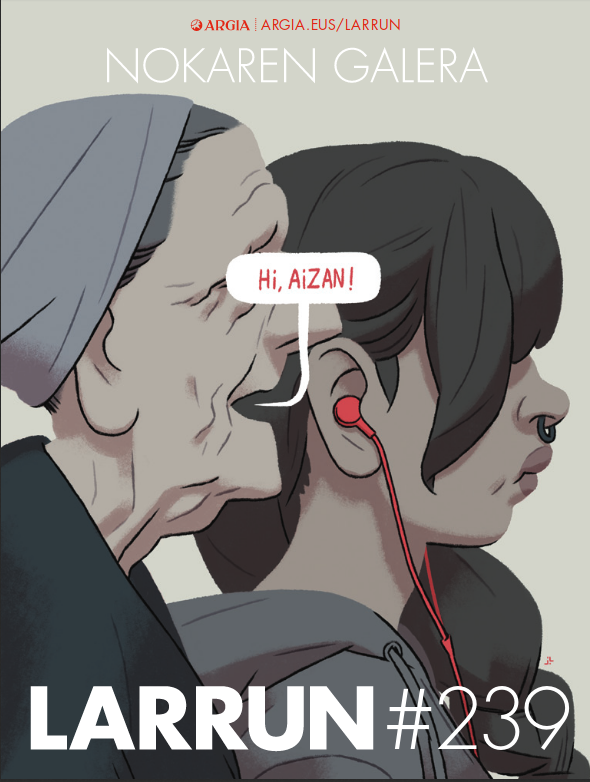Allocutive Agreement on:
[Wikipedia]
[Google]
[Amazon]
In
 Eastern dialects have expanded on this by adding the polite (formerly plural) pronoun to the system; in some,
Eastern dialects have expanded on this by adding the polite (formerly plural) pronoun to the system; in some,
Allocutive agreement at Everything2.com
Linguistic morphology Grammar Grammatical gender Basque language {{ling-morph-stub
linguistics
Linguistics is the scientific study of language. The areas of linguistic analysis are syntax (rules governing the structure of sentences), semantics (meaning), Morphology (linguistics), morphology (structure of words), phonetics (speech sounds ...
, allocutive agreement (abbreviated
An abbreviation () is a shortened form of a word or phrase, by any method including shortening, contraction, initialism (which includes acronym), or crasis. An abbreviation may be a shortened form of a word, usually ended with a trailing per ...
or ) refers to a morphological feature in which the gender of an addressee is marked overtly in an utterance using fully grammaticalized markers Trask, L. ''The History of Basque'' Routledge: 1997 even if the addressee is not referred to in the utterance. The term was first used by Louis Lucien Bonaparte in 1862.Bonaparte, L.-L. ''Langue basque et langues finnoises'' (1862) London
Basque
:''See also Basque verbs: Familiar forms and allocutive indices (hika).'' InBasque
Basque may refer to:
* Basques, an ethnic group of Spain and France
* Basque language, their language
Places
* Basque Country (greater region), the homeland of the Basque people with parts in both Spain and France
* Basque Country (autonomous co ...
, allocutive forms are required in the verb forms of a main clause when the speaker uses the familiar (also called "intimate") pronoun "thou" (as opposed to formal "you"). This is distinct from grammatical gender
In linguistics, a grammatical gender system is a specific form of a noun class system, where nouns are assigned to gender categories that are often not related to the real-world qualities of the entities denoted by those nouns. In languages wit ...
as it does not involve marking nouns for gender; it is also distinct from gender-specific pronoun
Personal pronouns are pronouns that are associated primarily with a particular grammatical person – first person (as ''I''), second person (as ''you''), or third person (as ''he'', ''she'', ''it''). Personal pronouns may also take different for ...
s, such as English "he/she" or Japanese ("I", used by males) and ("I", used by females). In Basque, allocutive agreement involves the grammatical marking of the gender of the addressee in the verb form itself.
Grammatically this is done by introducing an additional person
A person (: people or persons, depending on context) is a being who has certain capacities or attributes such as reason, morality, consciousness or self-consciousness, and being a part of a culturally established form of social relations suc ...
marker in the verb form (marked ):
versus
 Eastern dialects have expanded on this by adding the polite (formerly plural) pronoun to the system; in some,
Eastern dialects have expanded on this by adding the polite (formerly plural) pronoun to the system; in some, hypocoristic
A hypocorism ( or ; from Ancient Greek ; sometimes also ''hypocoristic''), or pet name, is a name used to show affection for a person. It may be a diminutive form of a person's name, such as '' Izzy'' for Isabel or '' Bob'' for Robert, or it ...
palatalization converts this to :
Some varieties have done away with the unmarked forms except in subordinate clauses: vs. 'that I go'
Its use is diminishing, especially the feminine forms.
Basque speakers who use allocutive agreement sometimes apply the masculine forms to women, making a genderless marker of solidarity.
Beja
Beja, a Cushitic language, has allocutive forms, marking the gender of a masculine addressee with the clitic ''=a'' and with ''=i'' for feminine addressees:References
External links
Allocutive agreement at Everything2.com
Linguistic morphology Grammar Grammatical gender Basque language {{ling-morph-stub